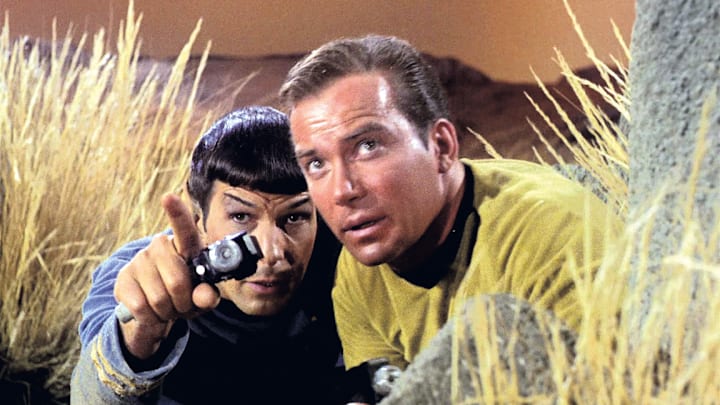Being a Star Trek fan exposes you to plenty of discourse about the series in the franchise, especially if you enjoy the original 79 episodes that ran from 1966-1969.
Recaps, reviews, and editorials abound, as do lists of the "best" and "worst" episodes of the series. It seems that the fandom is in agreement about several episodes being the worst of all time, so let's look back on them and ask, are they really that terrible?
1. "And the Children Shall Lead" (S3E04)
When a landing party beams down to the planet Triacus after receiving a distress call, they find the adult members of a scientific outpost dead. However, their children seem oblivious, playing games as they invite Kirk and the others to join them. Once on board, the children collude with what appears to be a shimmering angel that they can conjure with a chant. The angel gives the children abilities to undermine the crew's confidence, causing them to see things; for example, Sulu sees circles of daggers threaten the ship, and Uhura sees a future filled with pain and disease.
While Spock and Kirk work together and Kirk destroys the angel (or Gorgan, as Kirk calls it) by exposing his true intentions and making the children cry and release their grief, the message of how the innocent are often used as pawns gets lost in the odd and off-putting hand gestures of the children using their abilities.
The script is thin in spots, but the idea of the Gorgan causing severe anxiety to attack the adults at the Federation outpost is interesting, and the episode might be better received if it had focused on him rather than the children.
2. "Spectre of the Gun" (S3E01)
When the crew of the Enterprise must make contact with an alien race known as the Melkotians, Kirk ignores a warning buoy, and he, Spock, McCoy, Scotty, and Chekov beam down to make contact. A Melkotian appears and tells the landing party they are "disease" and must be destroyed using the violence of human history. A moment later, the landing party finds themselves in Tombstone, Arizona, where everyone there sees them as the Clanton gang, who were doomed to fight the Earps, Morgan and Wyatt, along with Doc Holliday, at the OK Corral.
Before the gunfight, Morgan confronts Chekov over the attentions of a woman named Sylvia, and Chekov appears to die after Morgan shoots him in the chest. The others then discover that the weapons they've made, such as a tranquilizer, are not effective. Kirk has Spock mind meld with each of them, and when the Earps and Holliday appear, their bullets are useless. It seems that Kirk wrestles with his urge to kill the Earps, but he and the others suddenly find themselves back on the bridge--including Chekov, who is no longer dead and remembers nothing, except Sylvia.
The problem with "Spectre of the Gun" is its tonal issues. The first 20 minutes or so lean toward light comedy (the bartender at the saloon is particularly hilarious and loves the sound of his own voice), but then it turns dark quickly as Kirk realizes they cannot leave Tombstone. A larger focus on who the Melkotians were might have helped to make this episode stronger.
3. "The Way To Eden" (S3E20)
Mention the phrase "Space hippies" to any Star Trek fan and they'll probably groan, "Not that episode!" Yes, that episode where Kirk and the crew pick up a group of space hippies in search of Eden. Unfortunately, their leader, Dr. Severin, is insane and takes over the ship--but not before there's a whole lot of singing and dancing and Chekov gets a romance arc. Eden turns out to be 100% acidic, Sevrin poisons himself, and the surviving hippies go their separate ways once McCoy heals their burns.
This episode is more silly than it is bad (as opposed to "Spock's Brain"). I quite like how Spock relates to Sevrin's followers (and how great a name is Tongo Rad?) Framed differently, the themes in this episode
